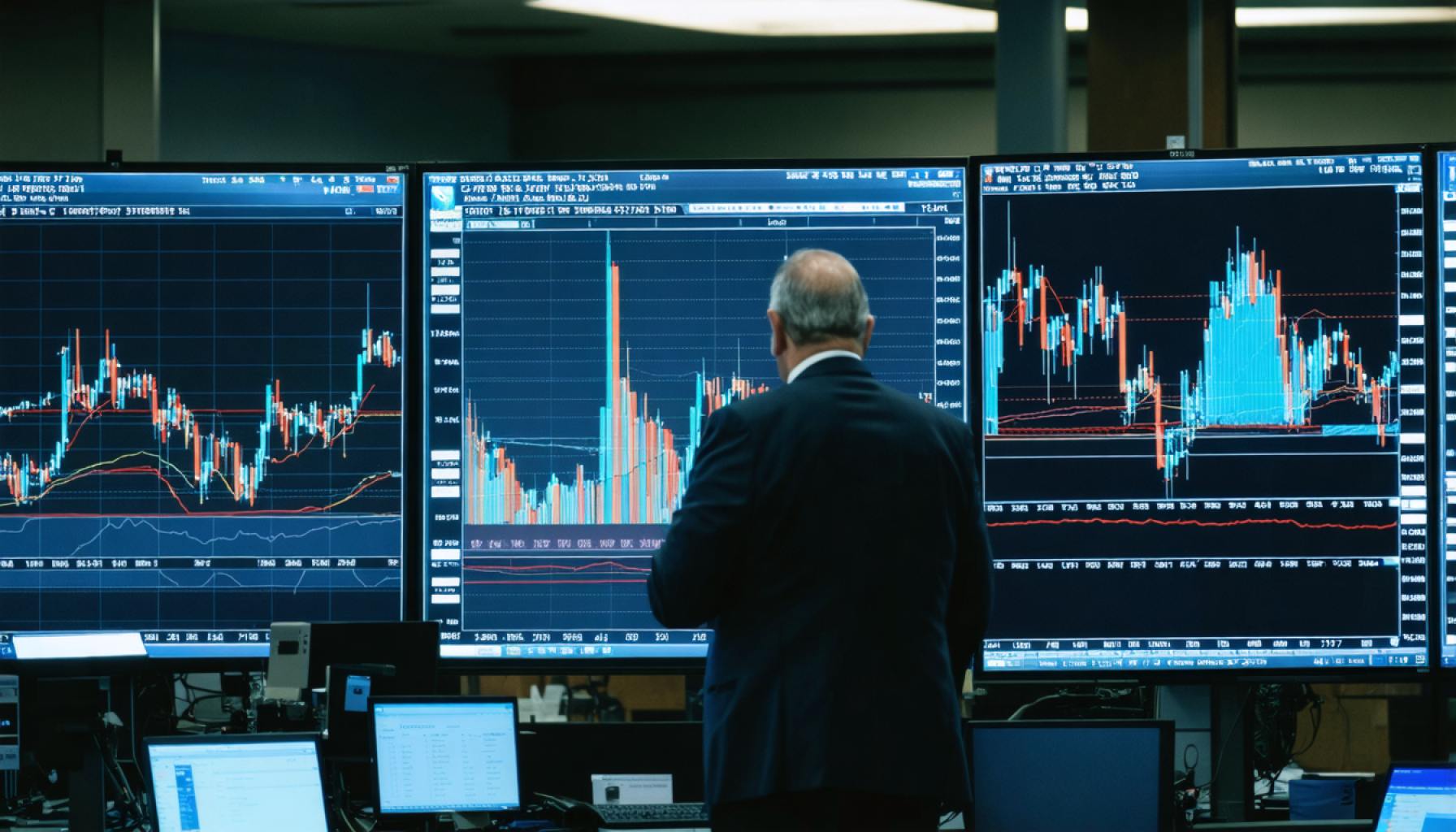- Wall Street experienced a significant downturn as tariffs caused major indices—Dow Jones, S&P 500, and NASDAQ—to fall by over 3.5%, with NASDAQ dropping over 4.5%.
- President Trump’s declaration of substantial tariffs on imports impacted global trade, causing the S&P 500 to lose over $5 trillion in market value.
- Commerce Secretary Howard Lutnick confirmed the administration’s firm stance on tariffs, reflecting a new economic policy approach.
- International retaliation ensued, with the European Union planning tariffs on $28 billion of U.S. goods and China implementing a 34% tariff on U.S. imports.
- Economic predictions varied, with some experts, like JP Morgan’s Michael Feroli, forecasting potential recession and higher unemployment.
- The situation highlights the interdependent nature of global economies and the need for careful consideration in trade policy to maintain stability.
Tumultuous waves swept through Wall Street as sweeping tariffs left a notable scar on the stock market, sending a tremor through both seasoned investors and everyday savers. The announcement of tariffs, a bold move with seismic implications, was clear proof that words alone can shift economies. As the first light of trading broke, the formidable trio—the Dow Jones, S&P 500, and NASDAQ—toppled, each falling more than 3.5%, with the NASDAQ leading with a staggering plunge over 4.5%.
This financial whirlwind originated from President Trump’s unyielding declaration earlier in the week to levy substantial duties on a myriad of imports, striking fear into the heart of global trade. The S&P 500 alone saw a sweeping loss of over $5 trillion in market value within mere trading days—a testament to the gravity of economic policy in shaping fiscal realities. America watched as its steadfast indices seemed to gasp for air under the weight of geopolitical pressures.
Contrary to the hopes of investors seeking a reprieve, the administration signaled no retreat. With steely resolve, Commerce Secretary Howard Lutnick affirmed the tariffs’ arrival. As conversations swirled across financial networks, it became apparent that this recalibration in trade policy was no mere negotiation tactic. Instead, it represented a cornerstone of a new economic stance that promised transformation at a cost.
The shockwaves extended beyond America’s borders, as retaliation brewed abroad. The European Union, poised to counter with precision, prepared a battalion of tariffs targeting $28 billion of U.S. products, while China, undeterred, matched the aggression with an echoing 34% tariff on U.S. imports.
Underneath this turbulent sea, economic minds raced to predict the future, casting the spectrum from recessionary fears to promises of a stabilized economy. JP Morgan’s chief economist, Michael Feroli, foresaw an economic downturn on the horizon, forecasting a contraction in GDP and a rise in unemployment—a stark reminder of the cost that tariff warfare could levy on a nation’s prosperity.
Yet, amidst the storm, a valuable lesson unfolds for both policymakers and citizens: global economies are a delicate weave of interdependencies, where each trade action resonates across continents and cultures. As the market adjusts, lawmakers and stakeholders must consider the intricate dance of diplomacy and economics, ensuring that moves in the corridors of power align with the broader aspirations of economic stability and shared prosperity. In this ever-evolving narrative, the balance of cooperation and competition will shape the markets and, indeed, the world.
The Ripple Effect of Tariffs: How Global Trade Policies Shake the Economy
The recent announcement of substantial tariffs by President Trump’s administration has left a significant mark on global financial markets. This bold economic shift not only shook major U.S. stock indices but also sparked a wave of international repercussions. Here, we explore additional insights into the unfolding trade scenario and its broader implications.
How Tariffs Impact Global Economies
1. Understanding Tariffs: Tariffs are essentially taxes imposed on imported goods. Their primary aim is to protect domestic industries by making foreign products more expensive, thus encouraging consumers to buy locally produced goods. However, they often lead to higher prices for consumers and can provoke retaliatory measures from other countries.
2. Market Melt: A Case Study: The Dow Jones, S&P 500, and NASDAQ’s significant drops highlight how sensitive global markets are to trade policy shifts. These indices serve as barometers of economic health, and such sharp declines can trigger widespread financial anxiety.
3. Retaliatory Measures: In response to U.S. tariffs, the European Union and China have planned counter-tariffs. This tit-for-tat strategy can lead to prolonged trade wars, impacting global supply chains and international relations.
Real-World Use Cases
– Business Strategies in Turbulent Times: Companies reliant on global supply chains might consider diversifying their suppliers to mitigate tariff impacts. Exploring alternate markets or adjusting pricing strategies can also help absorb increased costs.
– Investor Strategies: In volatile markets, diversifying portfolios is key. Investors may look at investing in sectors less impacted by trade policies, such as technology or domestic services.
Market Forecasts & Industry Trends
– Economic Projections: According to JP Morgan’s chief economist, Michael Feroli, the tariffs could lead to an economic downturn, with potential GDP contraction and increasing unemployment. Monitoring these economic indicators is crucial for anticipating future market movements.
– Industry Responses: Industries like automotive, agriculture, and consumer electronics are particularly vulnerable to tariff impacts due to their complex global supply chains. Companies may need to rethink logistics and production strategies to stay competitive.
Pros and Cons of Current Trade Policies
– Pros: Tariffs can boost local industries and reduce trade deficits. They may also force international stakeholders to renegotiate unfair trade practices.
– Cons: The immediate effect is market volatility, increased consumer prices, and strained international relations. Prolonged tariffs can lead to decreased economic growth and job losses in affected sectors.
Actionable Tips for Navigating Economic Shifts
– For Businesses: Conduct a thorough risk assessment of your supply chain. Consider stockpiling crucial materials and maintaining good relationships with international suppliers.
– For Investors: Stay updated on geopolitical developments. Explore investment options in emerging markets or sectors less influenced by trade policies.
– For Consumers: Be prepared for potential price increases on imported goods. Consider supporting local businesses to minimize the impacts of tariffs.
For more information on economic strategies and trends, explore these resources: JP Morgan Chase.
Understanding the depth and nuance of tariff impacts is crucial in this climate of economic unpredictability. By staying informed and adaptable, both individuals and businesses can better weather the storms of global trade shifts.







